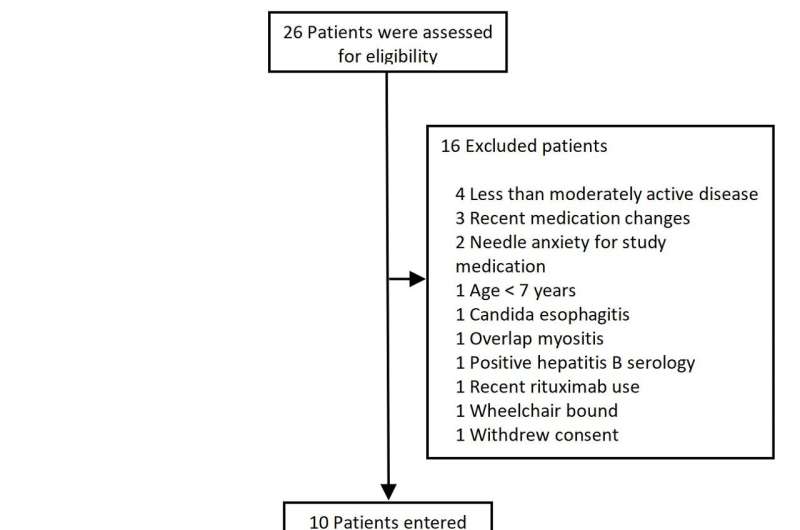This article has been reviewed according to Science X's editorial process and policies. Editors have highlighted the following attributes while ensuring the content's credibility:
fact-checked
trusted source
proofread
Abatacept therapy offers promising results for treating juvenile dermatomyositis

Juvenile dermatomyositis, a rare but often severe and chronic systemic autoimmune disease, includes a large number of patients who are treatment resistant, requiring long term immunosuppressive therapy. A small open-label study published in Arthritis and Rheumatology shows promise using a targeted biologic therapy called abatacept to treat such patients.
In the 24-week trial, ten patients with juvenile dermatomyositis ages 7 years or older with moderate disease activity who all received abatacept therapy had significant improvements in their muscle strength, physical function, endurance and skin rashes, as well as in the amount of muscle inflammation on MRI.
In addition, patients were able to lower the daily dose of corticosteroids during the trial, said Rodolfo V. Curiel, M.D., the study Principal Investigator and an Associate Professor of Medicine at the George Washington University School of Medicine & Health Sciences.
"This study makes an important contribution to the field of juvenile dermatomyositis," Curiel said. "Treatment resistant patients require long-term immunosuppressive therapy with glucocorticoids, methotrexate and other medications. This 24-week clinical trial suggests abatacept may be beneficial and a potentially safe option for refractory juvenile dermatomyositis."
Curiel says the study is the first clinical trial conducted to evaluate the safety and efficacy of abatacept in such patients. Further study must be conducted to verify the findings of this small, pilot study, he says.
"This is a breakthrough for juvenile dermatomyositis. The majority of these treatment-refractory patients improved at least moderately in clinical disease activity measures, as well as in two objective blinded measures, interferon genes and protein markers, reflecting downregulation of a key cytokine signaling pathway in JDM, and muscle inflammation on MRI. These data strengthen the trial findings and promise of abatacept for JDM, although further studies are needed," said Lisa G. Rider, M.D., Head, Environmental Autoimmunity Group, National Institute of Environmental Health Sciences, NIH in Bethesda, Maryland, and Clinical Professor of Medicine at George Washington University School of Medicine & Health Sciences.
More information: Rodolfo V. Curiel et al, Improvement in Disease Activity in Refractory Juvenile Dermatomyositis Following Abatacept Therapy, Arthritis & Rheumatology (2023). DOI: 10.1002/art.42450





















